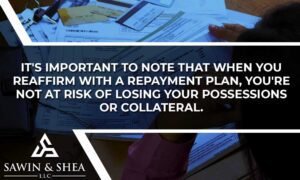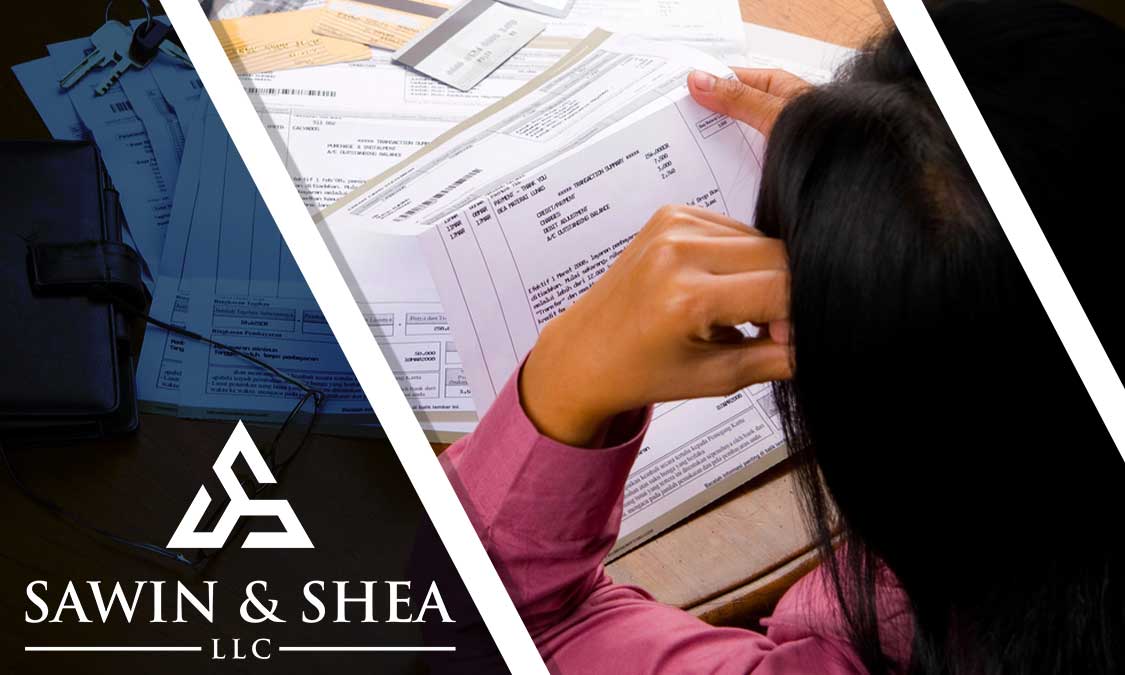If you’re considering bankruptcy, you may wonder which filing type is right for you. The two basic types of bankruptcy classifications for individuals and families are Chapter 7 and Chapter 13. A common question we receive regarding these forms is whether you can reaffirm a debt during the process.
Fortunately, we’re here to answer frequently asked questions regarding reaffirmation agreements and reaffirmed debt. In this blog, you’ll learn about whether you can reaffirm your debt in Ch. 13, the differences between Ch. 7 and Ch. 13, and how to enter into a reaffirmation agreement.
Have additional questions regarding bankruptcy or reaffirming secured debts? Here at Sawin & Shea, we have numerous years of experience practicing bankruptcy law and can answer your questions. You can get a free consultation with an attorney on our team to get started with your case.
What Is a Reaffirmation Agreement?

A reaffirmation agreement is a document that re-obligates a debtor to repay a particular debt, such as a car loan, mortgage, or other loan type. It basically serves as a legally binding promise that the person filing for bankruptcy will resume making payments in full and on time to the creditor.
Entering a reaffirmation agreement is a way that debtors in a Chapter 7 bankruptcy keep collateral attached to secured debt like houses or cars. The agreement makes you responsible for the debt again like the bankruptcy never happened for that debt. All of the original terms of the loan are back in force, including the creditor’s right to repossess the collateral if you get behind on payments in the future.
Reaffirming Debt in Chapter 13 Bankruptcy



Chapter 13 bankruptcy involves consolidating your different forms of debt into a three-to-five-year repayment plan. There is a Chapter 13 Plan that controls how various debts are treated. While you can certainly keep secured debt and things like houses and cars in a Chapter 13, there are no reaffirmation agreements. The Plan controls how those debts are handled.
A Chapter 13 is a great way to help people get caught up on secured debt that they are behind on. We can help people re-organize secured debt in various ways to help people stop repossessions or foreclosure and get back on track with payments to keep those items. A Chapter 13 is a way people can deal with debts and keep the things you need to successfully move forward.
What’s the Difference Between Chapter 13 and Chapter 7 Bankruptcy?
Unlike Ch. 13, Ch. 7 involves the liquidation of personal property and assets to repay a portion of your debt. Most of those who file Chapter 7 are not at risk of a house or vehicle repossession, but it is possible.
Chapter 7 is a great option for those who struggle to pay their loan bills and interest and who have minimal assets. This type of bankruptcy case will help you eliminate debts with high interest rates.
Who Is Eligible for Chapter 7 Bankruptcy?
To qualify for Chapter 7 bankruptcy, your average household earnings need to be below Indiana’s median income. Otherwise, you’ll need to undergo a means test. This test will consider details from your income, property, as well as your expenses to evaluate whether you qualify. There are sample means tests available online, but these tests are usually not entirely accurate. It’s best to work with a bankruptcy attorney to determine whether you’re eligible for Chapter 7 bankruptcy.
Chapter 7 Bankruptcy Process
The first step you’ll need to take to file bankruptcy is evaluate your current financial situation. While you’re not required to consult with a bankruptcy attorney, an experienced attorney can help you choose your best course of action in overcoming debt with interest, and they’ll ensure you file correctly with all necessary documentation.
Before filing, you’ll need to undergo credit counseling. You are required to complete credit counseling with an approved agency within 180 days of filing.
Once you prepare all necessary forms and complete credit counseling, you or your lawyer will file your bankruptcy petition.
Bankruptcy Court Process



After filing, the court handling your bankruptcy case will put an automatic stay that protects you from any collection activity. This means that a lender or creditor cannot recover the money you owe or take legal action against you. For instance, a mortgage lender cannot foreclose on your home while you undergo the bankruptcy process.
Next, the judge will assign a bankruptcy trustee to your case. The trustee is responsible for setting up the 341 meeting, known as the Meeting of Creditors. During this meeting, the trustee and attending creditors will ask you questions under oath regarding your financial situation and the validity of your petition. In addition to setting up the 341 meeting, they will sell your non-exempt personal property to repay a portion of your total debt.
Another important part of undergoing this type of bankruptcy is an obligatory financial management course. You are required to complete this course within 45 days of your 341 meeting to discharge your debt.
After completing your financial management course, your eligible unsecured debts will be discharged in bankruptcy. Common types of dischargeable debts include credit card debt, personal loans, and unpaid medical bills.
The bankruptcy discharge will not get rid of a creditor’s security interest, meaning collateral is still attached to the loan. Common types of secured debt include a mortgage, car loans, and boat loans. Those wishing to hold onto that collateral — such as a house or vehicle — need to reaffirm their mortgage or other debt through a written agreement.
Chapter 7 Reaffirmation Agreement
Entering a reaffirmation agreement is ideal for those who want to keep collateral through the Chapter 7 process. The creditor will not repossess your property because you enter a legally binding agreement stating that you’ll repay your collateral loans, such as a house mortgage or car loan. Once you sign this deal, your reaffirmation is that you will resume or continue paying on-time monthly payments to your mortgage holder or another lender.
In addition to protecting certain assets or collateral, this reaffirmation accord can help you with your credit as you undergo the bankruptcy process. Chapter 7 bankruptcy can negatively impact your credit score and will remain on your credit report for ten years after filing. When you enter the reaffirmation process, you can remain in good standing with some of your lenders, thus helping your score.
Mortgage lenders and other creditors are typically willing to enter reaffirmation agreements, but you must meet certain qualifications, and the bankruptcy court judge must approve. The judge may reject the reaffirmation contract if they determine that it’s unlikely you will actually make full debt payments to repay what you owe the lender for the mortgage.
In addition to the judge’s approval, the borrower must meet these requirements for reaffirmation:
- Debtors must sign the reaffirmation agreement within 60 days of the First 341 meeting.
- Both parties, the debtor and the creditor, must enter the reaffirmation contract and reaffirm the debt voluntarily.
- The debtor must file a reaffirmation statement in court stating they can pay off the loan without incurring additional financial harm.
- The creditor must allow the debtor to rescind the reaffirmation contract within 60 days of signing.
Can You Cancel a Reaffirmation Agreement?
Once you sign a reaffirmation agreement, you have sixty days to cancel it. Additionally, you can cancel the agreement if the bankruptcy court has yet to discharge your debts.
In order to cancel the agreement before the bankruptcy discharge or within sixty days, you or your bankruptcy lawyer will need to file a notice of rescission in court, and you’ll need to inform the lender.
A common reason why debtors cancel these agreements is due to a change in their financial situation. For instance, if you lose a source of income, you may realize that you can no longer afford to make monthly payments on your mortgage or other loan.
Another reason why you may want to cancel reaffirming your debt is if your property has depreciated in some way. If you total your vehicle, you may no longer take issue with having it repossessed in the liquidation process.
Finally, you may no longer want to reaffirm your debt if a third party wishes to purchase your property.
Your lender also has the right to cancel within sixty days of the signing. It’s highly unlikely that the lender will do this unless they discover new information that may impact your ability to repay your loan.
Contact a Bankruptcy Attorney
As a general rule, bankruptcy cases are often confusing and overwhelming, especially for those who wish to reaffirm a debt. Fortunately, you don’t need to go through your case alone — you can have a bankruptcy lawyer help you every step of the way, from payments to discharge.
An experienced bankruptcy attorney can ensure that you choose the best type of filing for your personal financial situation. The attorney will also help you file correctly and ensure you reach a favorable reaffirmation agreement with your lenders. They can also negotiate with lenders on your behalf and protect you against creditor harassment.
If you need assistance with your bankruptcy case in Indiana, contact Sawin & Shea LLC. We have 45 years of combined legal experience helping bankruptcy clients, and you can rest assured that we’ll handle your bankruptcy case payments with the utmost attention and care.
You can schedule a consultation with an attorney on the team today at no cost by calling 317-759-1483, or you can contact us online here.



